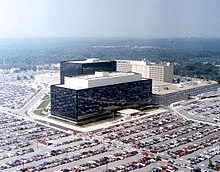NSA to participate in U.S. cybersecurity
Monday, July 6, 2009

Photo:NSA
The Obama administration has given the National Security Agency powers to screen private Internet traffic going to and from government sites, and will use AT&T telecommunications as a likely test site. The Obama administration remains firm in this decision, which was put forth during the Bush administration.
The agency defends military networks with a classified system named Tutelag, which decides how to handle malware intrusions (for example, whether to block them or to investigate more closely). "We absolutely intend to use the technical resources, the substantial ones, that NSA has," said Janet Napolitano, Secretary of the United States Department of Homeland Security (DHS). DHS's intrusion detection program, Einstein version 3, is in development as version 2 is being deployed. The program defends all U.S. government agencies and departments.
DHS spokeswoman Amy Kudwa said, "We are moving forward in a way that protects privacy and civil liberties."
AT&T, the chosen test site under Bush, sought assurance from the Obama administration to determine what elements of Einstein 3 to preserve. AT&T officials declined to comment.
In 2006 the Electronic Frontier Foundation filed the class action lawsuit Hepting v. AT&T—currently awaiting decision—against AT&T, which under the Bush administration permitted the NSA to look at domestic communications without a warrant. NSA's intelligence gathering is limited only to foreign communications.
"We came away saying they have a lot of work in front of them to get this done right," Ari Schwartz of the Center for Democracy and Technology (CDT) said. "We're looking forward to their next steps."
Schwartz authored a letter on Einstein to the Office of Management and Budget in December 2008 on behalf of the Information Security and Privacy Advisory Board.
NSA director Keith B. Alexander said in April 2009 that the NSA will help, but does not want to take charge. Several people—including Rod Beckstrom, who resigned over the issue as head of the National Cyber Security Center (NCSC); Bruce Schneier of BT Counterpane; Leslie Harris, president and CEO of CDT—and not Dennis Blair, Director of National Intelligence—have urged the Obama administration to keep the Department of Homeland Security in charge despite its low scores, because, they claim, the NSA is a spy agency.
Sources
- Ellen Nakashima. "Cybersecurity Plan to Involve NSA, Telecoms" — The Washington Post, July 3, 2009
- Siobhan Gorman. "Troubles Plague Cyberspy Defense" — The Wall Street Journal, July 3, 2009
- Matthew D. LaPlante. "New NSA center unveiled in budget documents" — The Salt Lake Tribune, July 2, 2009
- Joseph Menn and Demetri Sevastopulo. "NSA snubs cyber security call" — Financial Times, April 22, 2009
- Grant Gross. "CDT: Privacy, Transparency Needed in Cybersecurity Policy" — PC World, April 15, 2009
- Jaikumar Vijayan. "Beckstrom's resignation lifts lid on opposition to NSA's cybersecurity role" — Computerworld, March 11, 2009
- Ari Schwartz. "Letter Jim Nussle, Director, Office of Management and Budget" — National Institute of Standards and Technology, December 10, 2008
- "Hepting vs. AT&T" — Electronic Frontier Foundation, January 2006

